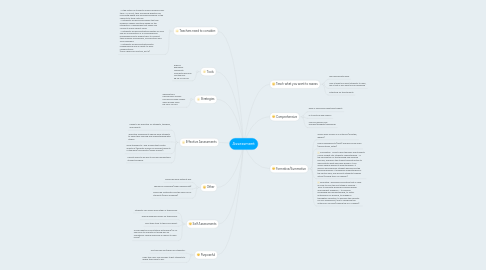Assessment
by Marsha Hitchcock

1. Self Assessments
1.1. Students can assess each other or themselves
1.2. They're generally harder on themselves
1.3. Give them time to think and refelct
1.4. Avoid negative connotations with failure (ie: no sad faces to indicate not doing well on something--failure should be a chance to learn more!)
2. Purposeful
2.1. Will this help you/help your students?
2.2. Does this offer you avenues to get students to where they need to be?
3. Other
3.1. should be done without bias
3.2. should be modifiable (when appropriate)
3.3. should be systematic and the same for all studnets (unless modified)
4. Effective Assessments
4.1. needs to be effective for students, teachers, and parents
4.2. "effective assessments should allow students to share their learning and understanding with others"
4.3. allow teachers to: "use scoring that is both analytical (separate scores for different aspects of the work) and holistic (single scores)."
4.4. Parents need to be able to see and understand student progress
5. Strategies
5.1. Observations Performance Assess. Process Focused Assess. Open Ended Tasks pg 49 of MPYPH
6. Tools
6.1. Rubrics Exemplars Checklists Anecdotal Records Continuums pg 49 of MPYPH
7. Teachers need to consider:
7.1. • if the nature of students’ inquiry develops over time—if, in fact, they are asking questions of increasing depth and providing evidence of the capacity to think critically • if students are becoming aware that real problems require solutions based on the integration of knowledge that spans and connects many subject areas • if students are demonstrating mastery of skills and an accumulation of a comprehensive knowledge base to enable them to conduct their inquiries successfully, find solutions and solve problems • if students are demonstrating both independence and an ability to work collaboratively. (from a Basis for Practice, pg 15)
8. Teach what you want to assess
8.1. age appropriate goals
8.2. look at what you want students to learn, ask if that is also what you're assessing
8.3. intersting for the students
9. Comprehensive
9.1. does is summarize what was taught?
9.2. is it practical and useful?
9.3. can you explain your process/thoughts/reasoning?
10. Formative/Summative
10.1. assess daily as well as in intervals (monthly, weekly)
10.2. formal assessments (tests) and less formal ones (observations, notes)
10.3. Summative: "aims to give teachers and students a clear insight into students’ understanding ... is the culmination of the teaching and learning process, and gives the students opportunities to demonstrate what has been learned. It can assess several elements simultaneously: it informs and improves student learning and the teaching process; it measures understanding of the central idea, and prompts students towards action"(Making the PYP Happen).
10.4. Formative: "provides information that is used in order to plan the next stage in learning ... aims to promote learning by giving regular and frequent feedback ... to improve knowledge and understanding, to foster enthusiasm for learning, to engage in thoughtful reflection, to develop the capacity for self-assessment, and to recognize the criteria for success"(Making the PYP Happen).


